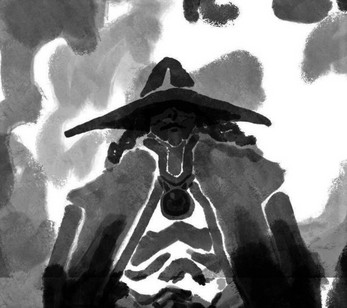When The Gods Weren't Looking
A downloadable game
A Different Kind of Fantasy Game
This is a challenging tabletop RPG where you don’t level up by killing things or collecting treasure—you level up by becoming a better version of yourself while doing those things.
You play as a poor worker in a medieval (maybe magical) world, drawn into situations that test your beliefs, expose your contradictions, and force you to grow. Every choice you make—what you ask, what you notice, how you act—builds your character, not just your sheet.
This game takes a hard look at the unspoken assumptions baked into traditional RPGs. Sometimes it fixes them. Sometimes it leans in harder. Either way, it never pretends they’re not there.
What Makes It Different:
-
Players never roll dice. That’s the GM’s job.
-
Players don’t wait for boxed text. They ask questions and build the scene by exploring it.
-
Skills level up when your group notices. Not when a chart demands it.
-
Traits are earned by playing your character honestly.
-
Each session lasts exactly one hour. After that: you rest, you reflect, you grow.
-
Magic is learned by touching monster parts or ancient relics. You don’t “unlock” it. You encounter it.
Player conflict and agreement, and meta intrusions into the characters are rewarded. We won't pretend like these things don't exist.
For GMs:
-
No story prep. Just pick a few keywords and roll.
-
You’re not responsible for holding it all together. The group is.
-
You roll the dice. Players focus on play.
-
The world changes based on how the players play. You build the next session from what happened in the last.
-
Villains grow from play. Not from lore.
This is a game about belief, change, consequence, and play that matters. The story doesn’t exist until the players show up. The world isn’t built until they touch it.
---------------------------------------------------------------------
The draft provided is still a very rough draft as far as polish and formatting, the central ideas and rules are there, playable, and layed out intently.
AI Disclaimer
This description was helped by AI, and the 'beta test playtest questionnaire' was made by AI and lightly modified by me. The game itself has 0 input from AI. Written by me and no ideas are talked with or filtered through AI.
---------------------------------------------------------------------
Rules Sample:
Summary of Rest and Reward – Earning Skill Ranks:
At the end of each session, during the “Rest and Reward” phase, each player earns one Skill Rank. Other players (not the one receiving the Rank) choose which Skill it goes into, based on:
-
Most-used Skill
-
Most cleverly-used Skill
-
Skill used in the most difficult situation
The receiving player may not speak or argue, and can only influence future decisions through their in-game actions.
The Three Aspects of the GM Role
Unlike traditional RPGs where the GM is a rules arbiter and storyteller, this game defines the GM as a reactive worldbuilder and facilitator of belief-driven narrative. Their core duties are divided into three aspects:
Aspect One: In-Game Improvisation
Purpose: Bring the world to life in response to players' curiosity and actions.
-
No pre-written plot. Stories emerge from character beliefs and how players engage with situations. Pre writing is against the rules.
-
Scene framing: Always introduce with exactly two sentences:
-
One sentence describes movement (dynamic, sensory detail).
-
One sentence introduces myth logic or an obvious item that symbolically hints at mood, stakes, or theme.
-
-
Player-driven detail: After the intro, players build the world by asking questions or assuming things are present.
-
GM only adds detail when asked or when an action demands mechanics.
-
Difficult Scenarios are introduced when pacing or world cohesion needs a check—requiring effort, special items, or skills to access areas or content.
Aspect Two: Quests and Events
Purpose: Provide structure to player motivation and momentum while keeping story emergent.
-
Quests are not handed out. They form when players pursue their beliefs or desires in the world.
-
Events are moments of interruption, escalation, or redirection. They:
-
Add tension
-
Reveal secrets
-
Challenge comfort zones
-
-
Use quests to mirror character arcs:
-
Internal conflict (belief vs. reality)
-
Interpersonal conflict (between characters)
-
External challenge (the world’s resistance)
-
Public threat (something larger, collective)
-
-
Quests should feel personal, not generic. A character’s change is the resolution, not a completed task list.
Aspect Three: The Villain and Overarching Story
Purpose: Give the long-term narrative shape, driven by ideological opposition.
-
Villains are thematic, not just strong. They hold opposing beliefs to the players' and test them.
-
Construct villains with:
-
A core belief or flaw
-
A mythic presence (rumors, omens, strange effects)
-
A slowly unfolding web of influence
-
-
The villain’s growth reflects the players’ growth—as players ascend (through Hero Points and belief evolution), the villain also strengthens.
-
The “main story” is built retroactively, based on how players interact with this antagonistic force.
GM Tools That Support All Three
-
Fixation: Tie failed Skill checks to world elements (mysteries or Unsettlements). When the Skill is used again in a thematically relevant way, the character gets a bonus.
-
NPCs and Unsettlements: Prepare loose elements that can be dropped into play. NPCs have a want, a have, and a Skill. Unsettlements are open mysteries (object/person/place) with tension built in.
-
World reacts to the players. Group behavior, emotional tone, and morality shift the tone of the world—codified as World Traits.
| Updated | 1 day ago |
| Published | 3 days ago |
| Status | In development |
| Category | Physical game |
| Author | briannissen |
| Genre | Role Playing |
| Tags | Fantasy, Magic, Magical Realism, realistic, Tabletop |
Download
Development log
- The Gods Begin Seeing1 day ago
- GM's two Sentence Intro3 days ago
- Expectations and High Level Play3 days ago
